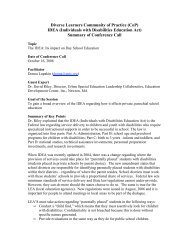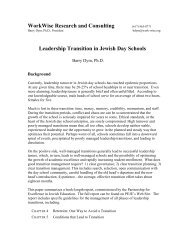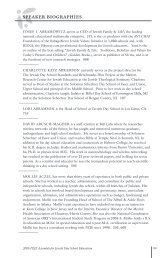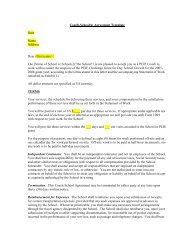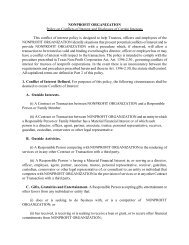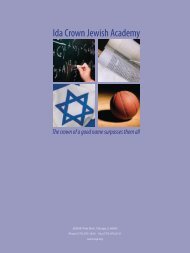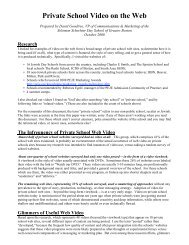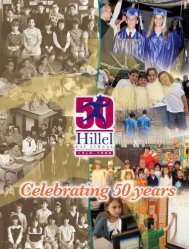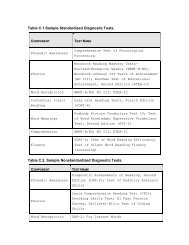Dr. Jonathan Paradise is EmeritusPr<strong>of</strong>essor <strong>of</strong> Hebrew at the University<strong>of</strong> M<strong>in</strong>nesota.Repr<strong>in</strong>ted with permission <strong>of</strong> the author.HEBREW: WHO NEEDS IT?Jonathan ParadiseWe are liv<strong>in</strong>g and witness<strong>in</strong>g one <strong>of</strong> themost spectacular events <strong>in</strong> <strong>Jewish</strong> culturalhistory: The revival and flower<strong>in</strong>g <strong>of</strong> Hebrewas a spoken language after centuries<strong>of</strong> restricted use. Each year sees an outpour<strong>in</strong>g<strong>of</strong> poetry, essays, novels, and publishedresearch <strong>in</strong> an astonish<strong>in</strong>g array <strong>of</strong>fields.The outpour<strong>in</strong>g <strong>of</strong> Hebrew creativity is <strong>of</strong>avalanche proportions. University librariesaround the world spend many, many thousands<strong>of</strong> dollars each year <strong>for</strong> new acquisitions,to keep up with the pace <strong>of</strong> publication.Hebrew is alive, full <strong>of</strong> vitality, add<strong>in</strong>gand consolidat<strong>in</strong>g new vocabularies and idiomsat an ever-accelerat<strong>in</strong>g pace. Indeed,the revival <strong>of</strong> Hebrew culture ranks amongthe greatest achievements <strong>of</strong> modern <strong>Jewish</strong>History.Yet what would we Jews <strong>in</strong> the UnitedStates know <strong>of</strong> all <strong>of</strong> these truly epochmak<strong>in</strong>gdevelopments if we were to look atour own <strong>Jewish</strong> communities’ use <strong>of</strong> Hebrew<strong>in</strong> the public sector? If we were to exam<strong>in</strong>eourselves, much as a visit<strong>in</strong>ganthropologist studies and analyzes a <strong>for</strong>eignculture?We might beg<strong>in</strong> by ask<strong>in</strong>g, “What are theroles Hebrew plays <strong>in</strong> the life <strong>of</strong> an averageAmerican <strong>Jewish</strong> child and especially <strong>in</strong> theeyes <strong>of</strong> typical parents?” What situationsoccur—either frequent or occasional—where the knowledge <strong>of</strong> the Hebrew languageis brought <strong>in</strong>to play? What rewardsdoes <strong>Jewish</strong> society extend or deny personson the basis <strong>of</strong> their competence <strong>in</strong> the Hebrewlanguage?The answers to these questions and theothers which could be posed by our hypothetical“anthropologist” are crucial. For itis those answers that will determ<strong>in</strong>e thedegree to which members <strong>of</strong> the society regardthe task <strong>of</strong> Hebrew language acquisitionas an important one. If Hebrew isimportant—<strong>in</strong> the “real world”—then time,ef<strong>for</strong>t, and resources become “worthwhile”<strong>in</strong>vestments. And if Hebrew is consideredtrivial or <strong>of</strong> marg<strong>in</strong>al importance, the reversewill be true.The sad fact is that the Hebrew language is<strong>of</strong> marg<strong>in</strong>al importance <strong>in</strong> most sectors <strong>of</strong>the American <strong>Jewish</strong> Community. Amongthe various “mitzvot“ observed by the subsets<strong>of</strong> organized Jewry— philanthropic activity,support <strong>for</strong> Israel, observance <strong>of</strong>Sabbath and festivals, kashrut, service tosynagogue and federation—the study anduse <strong>of</strong> Hebrew as a means <strong>of</strong> communication,as a <strong>Jewish</strong> Language, does not ranklow <strong>in</strong> the list <strong>of</strong> the card<strong>in</strong>al duties <strong>of</strong> Jew.It is not even on the list.This be<strong>in</strong>g the case, it should surprise noone that competence <strong>in</strong> the spoken or writtenlanguage is rare among lay persons <strong>in</strong>the American <strong>Jewish</strong> community. After all,why should anyone <strong>in</strong>vest the time and ef<strong>for</strong>trequired to learn skills that are useless?And <strong>for</strong> the present, Hebrewknowledge is useless. The most that is required(<strong>in</strong> some quarters) is alphabet tra<strong>in</strong><strong>in</strong>g:i.e., the ability to decode the phoneticvalue <strong>of</strong> the symbols without regard <strong>for</strong>mean<strong>in</strong>g. This, so that the person may recitethe prayers at an acceptable pace.Now, it is not an easy task these days toget people to derive satisfaction from roterecitation <strong>of</strong> mean<strong>in</strong>gless sounds. It isnatural to resist it. Nor is it an easy taskto master the “read<strong>in</strong>g” <strong>of</strong> lengthy textsModern Hebrew culture, Hebrew language, liv<strong>in</strong>g and spoken, should berecognized as a natural component <strong>of</strong> be<strong>in</strong>g <strong>Jewish</strong>. The knowledge <strong>of</strong> thelanguage and ability to use it with ease should be seen as an <strong>in</strong>dispensableadjunct <strong>of</strong> a fuller and more mean<strong>in</strong>gful <strong>Jewish</strong> life.P A G E 32 • C O N T I N U I T Y M A G A Z I N E
when you lack the essential elements <strong>of</strong>mean<strong>in</strong>g, logic, and the expectations providedby grammar and idiom. But more tothe po<strong>in</strong>t here is the fact that limit<strong>in</strong>g thepublic role <strong>of</strong> Hebrew to ritual and liturgyprovides little <strong>in</strong>centive <strong>for</strong> learn<strong>in</strong>g Hebrewas a language.I once described to a pr<strong>of</strong>essor <strong>of</strong> ESL(English as a Second Language) the phenomenon<strong>of</strong> “Hebrew School” graduateswho have attended anywhere from five toten years but have not learned to understandor speak the language. Her only comment:“They must not have needed to.”Who are the adults who express the needto learn to speak Hebrew by enroll<strong>in</strong>g <strong>in</strong> anUlpan course? Are they not, <strong>in</strong> large part,people who acquired a strong motive aftera visit <strong>in</strong> Israel or who are plann<strong>in</strong>g a visitor aliyah? Who are the youngsters who arestill study<strong>in</strong>g Hebrew after their Bar/BatMitzvah? Often they are members <strong>of</strong> an organizationthat utilizes Hebrew <strong>in</strong> its activities,alumni <strong>of</strong> a Hebrew summer camp, orpersons who have participated <strong>in</strong> a trip toIsrael. In other words, when people encounterthe real language, they suddenlydevelop a need to know.The necessity <strong>of</strong> creat<strong>in</strong>g a “need” <strong>for</strong> Hebrewis the central thesis <strong>of</strong> this essay.Until we change that fact <strong>of</strong> reality, Hebrewteachers <strong>in</strong> the United States will cont<strong>in</strong>ueengag<strong>in</strong>g <strong>in</strong> non-functional education. Notbecause <strong>of</strong> the methods or the curriculathat are used, but because, <strong>in</strong> the contextthat we f<strong>in</strong>d ourselves <strong>in</strong>, Hebrew is notperceived as a particularly useful and necessary“commodity.” This fact, more thanany other, is at the root <strong>of</strong> the unhappy situation<strong>in</strong> Hebrew Education.The necessity <strong>of</strong> creat<strong>in</strong>g a “need” <strong>for</strong> Hebrew is the centralthesis <strong>of</strong> this essay. Until we change that fact <strong>of</strong> reality,Hebrew teachers <strong>in</strong> the United States will cont<strong>in</strong>ue engag<strong>in</strong>g<strong>in</strong> non-functional education.We need to change drastically the imageand the roles given to the Hebrew language<strong>in</strong> the Diaspora. We must do th<strong>in</strong>gs <strong>in</strong> publicsett<strong>in</strong>gs that stimulate, motivate, andenhance Hebrew study. Our goal must be todemonstrate that knowledge <strong>of</strong> Hebrew isuseful, psychically reward<strong>in</strong>g, desirable,and socially acceptable. Above all, we mustcreate conditions which make some knowledge<strong>of</strong> Hebrew necessary <strong>for</strong> full participation<strong>in</strong> certa<strong>in</strong> areas/aspects <strong>of</strong> <strong>Jewish</strong> communallife. If we can manage to <strong>in</strong>troducethe need <strong>for</strong> Hebrew <strong>in</strong> enough areas, wewill have done the trick.What follows are some suggestions <strong>for</strong>mak<strong>in</strong>g Hebrew one <strong>of</strong> the “identitybadges” that we wear as Jews. Many <strong>of</strong> thesuggestions <strong>in</strong>volve a passive or rather, a“receptive” use <strong>of</strong> Hebrew. Through visualor aural stimulation we gradually acquireskills <strong>in</strong> recognition <strong>of</strong> words and phrases.I make no claim <strong>for</strong> orig<strong>in</strong>ality <strong>in</strong> these suggestions,Most, if not all, have been implementedat one time or another.• Community build<strong>in</strong>gs, synagogues canuse Hebrew signs along with the Englishsigns that already exist, For example:“Men,” “Women.” “Bullet<strong>in</strong> Board,” “Push/Pull,” “Quiet Please,” “No Smok<strong>in</strong>g,” “Welcome,”“Kipot/ Talitot,” “Library,” “Office,”“Auditorium,” “Swimm<strong>in</strong>g Pool,” “SnackBar.”• Pr<strong>in</strong>ted Programs <strong>of</strong> concerts, order<strong>of</strong> services, menus <strong>of</strong> communal d<strong>in</strong>ners,etc. should be bi-l<strong>in</strong>gual.• Certificates <strong>of</strong> awards should <strong>in</strong>cludea Hebrew text.• Manufacturers <strong>of</strong> foods and other productsshould be encouraged to <strong>in</strong>clude HebrewVersions <strong>of</strong> the contents and directions<strong>for</strong> use.• Greater encouragement should begiven to <strong>in</strong>dividuals and organizationsto pr<strong>in</strong>t the <strong>in</strong>vitations to social events,wedd<strong>in</strong>gs and bar-mitzvahs <strong>in</strong> Hebrew.• Hebrew Songs. S<strong>in</strong>g<strong>in</strong>g and/or poetrycan be made a part <strong>of</strong> board meet<strong>in</strong>gs, clubevents (adult and youth), Rabb<strong>in</strong>ical Assemblymeet<strong>in</strong>gs, Federation meet<strong>in</strong>gs,school faculty meet<strong>in</strong>gs, and study groups.There is no more effective vehicle <strong>for</strong>comb<strong>in</strong><strong>in</strong>g language, cultural and ideologicalvalues, and emotional attachmentthan songs. Moreover, these songs seem tobe immortal. After years <strong>of</strong> not s<strong>in</strong>g<strong>in</strong>g aparticular song, we are able to recall textand melody.• Encourage groups to sponsor even<strong>in</strong>gs<strong>of</strong> Hebrew s<strong>in</strong>g<strong>in</strong>g and danc<strong>in</strong>g.• Introduce the use <strong>of</strong> Hebrew <strong>in</strong> BarMitzvah, Bat Mitzvah, and Wedd<strong>in</strong>gceremonies and celebrations. Both thechildren and the wedd<strong>in</strong>g couple mightmake short speeches <strong>in</strong> Hebrew. In bothceremonies, the Rabbi might deliver part<strong>of</strong> his “charge” to the child or couple <strong>in</strong>Hebrew.A P U B L I C A T I O N O F Y I T Z H A K R A B I N H I G H S C H O O L“ A L i f e t i m e o f L e a r n i n g ” • P A G E 33



